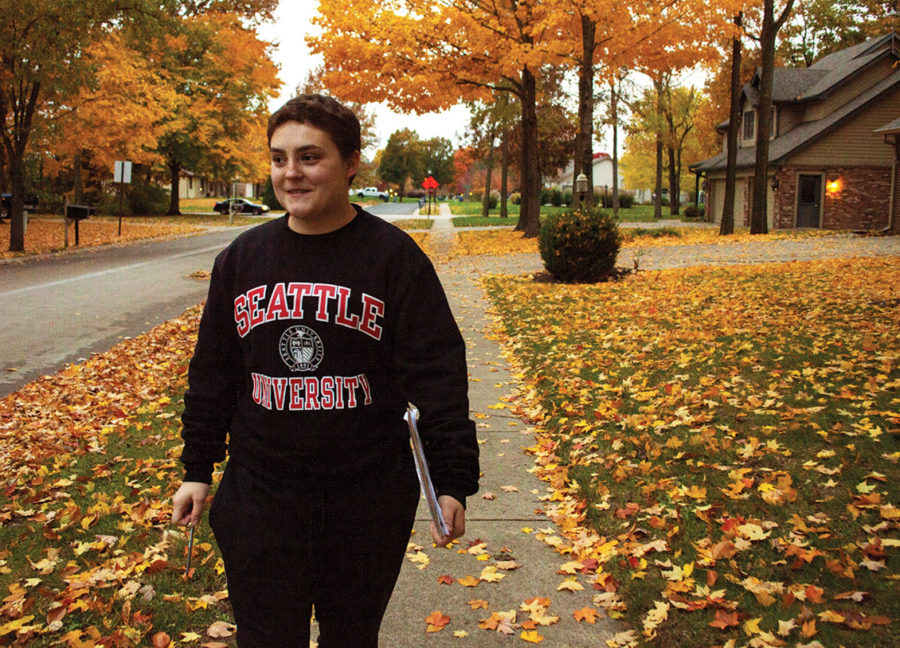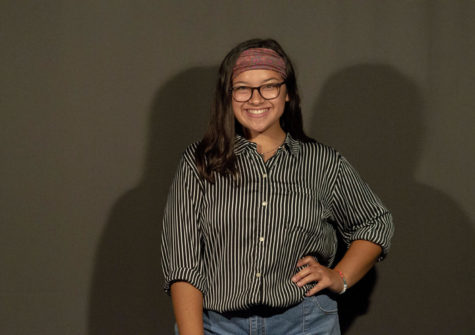Torn apart
The state of our union is less united than ever
November 14, 2018
For the last few weeks, Americans have been bombarded with ads for – and against – political candidates. They ran constantly on TV, in our mailboxes, and on the radio. For many people, politics became a constant topic of conversation. The midterms are often not as electrically charged with tension as the primaries, but tensions in this elections were running high.
Some Americans barely take notice of when the elections are. Others can’t escape it. However, differences in political opinion can drive the best of friends apart; it has shattered families and ruined friendships.
Many students are able to relate to having political tension in their houses. Some students have the opinions and party affiliations that they grew up with. Others have diverged from their parents’ ideals and have started creating their own. If a student’s opinions don’t clash with their parents’, they’ll often clash with their classmates’ beliefs.
Now more than ever, it seems that politics are omnipresent in the day-to-day discussions of the younger generation. Sure, we’ve been talking about plenty of superficial topics, but if you ask any teenager his or her opinion on a controversial topic, that student will definitely have pages worth of things to say.
For both teenagers and adults, often times those arguing won’t be able to back their opinions with factual evidence. This is a source for much of the socio-political turmoil. People who don’t know what they’re talking about are shouting and those who have done their research are being drowned out.
However, rather than this being the reason we should all call it quits, put our earbuds in, and let the loudmouths have it, this is the exact reason students should become more involved.
Importance of voting
Many people at NHS are involved in politics in one way or another, including teachers. Butch Robbins, a social studies teacher of thirty three years, minored in political science in college and has long been involved in politics, both inside and outside of his government classes.
“If you don’t pay attention or get involved, you don’t have the right to gripe and complain about it. If you want that right, get involved,” Robbins said. “If you don’t pay attention to what is going on, then the leaders could pass regulations that go against this generation’s beliefs.”
Like many in this election cycle, Robbins is extremely aware of the divide that politics has caused.
“People are going to disagree, and that’s okay. What is not okay is when you bash or you shout down someone and not let them voice their opinion. We all have that right,” Robbins said.
The U.S. system of politics is a complicated one by itself. Mix in the question of morals and opinions and the whole situation gets even more difficult.
“The political parties want to control the government so they can create society according to their beliefs,” Robbins said. “Just because you have a certain opinion doesn’t mean it’s going to be put into policy. We don’t always get what we want. And unfortunately a lot of people think they should.”
Students getting involved
The Twenty-Sixth Amendment to the United States Constitution guarantees the right to vote for all citizens aged 18 and older. Prior to its ratification over 47 years ago, the minimum voting age was 21.
The argument for the Twenty-Sixth Amendment was simple. During World War II, the draft age was lowered to 18 years of age. However, since the voting age at that time was 21, many felt it was unfair that soldiers who returned from fighting would not have the right to participate in the democracy that they defended with their lives.
During the Vietnam War, the combination of student activism and the conscription of thousands of more men too young to vote led Congress to decide to lower the voting age. The process of ratification for the Twenty-Sixth Amendment was the fastest in the history of the Constitution, taking only three months from the floor of Congress to national ratification.
However, half a century later, youth turnout hasn’t increased. In fact, voters aged 18 to 24 have consistently gone to the polls less than other all other age groups. However, with the midterm elections and the upcoming 2020 presidential contest having such high stakes, many young people are putting their voices out there.
Senior Hannah Tomlinson has been an intern with the Indiana Democratic Party for over two months. The group has been working to increase voter participation in the 2018 midterms.
“The midterms are very important to me because in my opinion they are just as important as any other election,” Tomlinson says. “Voting in the midterms, especially this year’s, is key in deciding the majority in Congress. Not only that, it is our duty as Americans to vote because it decides the fate of our country, and is what democracy is founded on.”
In her internship with the Indiana Democratic Party, Tomlinson makes calls to identify and connect with potential voters, and encourages Americans to vote. Although her job is to reach out to voters of all different groups and backgrounds, Tomlinson thinks that young people serve as an important force for the politics of the future.
“Our generation, someday, will be the generation to run the country, as every generation eventually is,” Tomlinson says. “Because of our generation’s current activism in politics, when the time comes for us to run the country, we will be able to get a lot done because of the experience we already possess and our drive to change the world.”
Invasiveness of politics
With the rhetoric and results of the 2018 midterm elections, it’s impossible to ignore how divisive the political climate in the United States has become over the past few years. It almost seems like both sides of the political spectrum are racing away from their traditional centers, with new factions in both parties rising in intensity and volume.
Whether or not this political polarization is over hyped by social media and choice rhetoric is up for debate, but there’s no denying that the increased political conflict has become invasive in the lives of many in this country. For some households, family dinners have turned into shouting matches over the current events of the day. Despite what some may say, everyone has a political opinion in one way or another, no matter how informed or uninformed it is. We’ve taken people’s political views and used them as judges of their moral character, ignoring what may have led them to come to where they are ideologically.
“I think political opinions can really tear friendships apart,” said junior Jason Paullus. “You can be completely good friends with someone and you bring up politics and it can ruin it. You hate that person. You can’t be with that person anymore.”
It’s important to ask ourselves these questions: what does it say about our society that people are cutting off friends and families for their political positions? How did we get to the point where Americans are blocking each other on social media or insulting each other because of these persuasions? Is this something that is chronic (albeit in a new form), or is it a recent development? When will it stop?
From the Congressional baseball shooting of Steve Scalise, the rallies and violence in Charlottesville, and the attempted mail bombings of several high-profile Democrats, it also feels that violence has become intertwined with politics. Although there have been arguably more violent periods in U.S. history, these events are still relevant to the climate of the country.
What are we to do when so much seems at stake? “Get out and vote,” Robbins said. “Let your voice be known. [You] can’t gripe about the government unless you vote.”
“What our government does now will affect our futures immensely,” Tomlinson said, “If you want to make a change in our country, the best way to do it is to vote and get involved in politics.”






